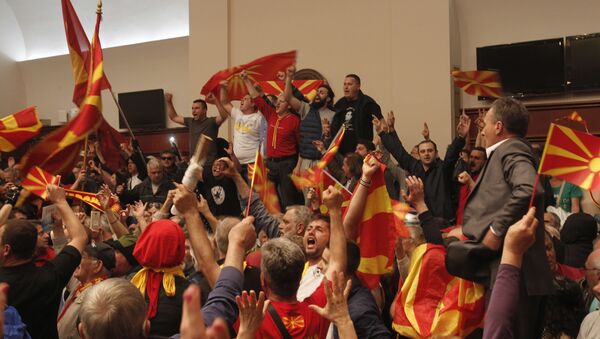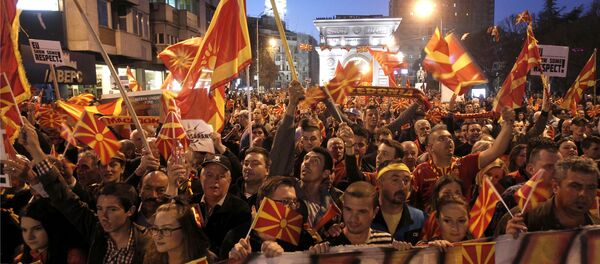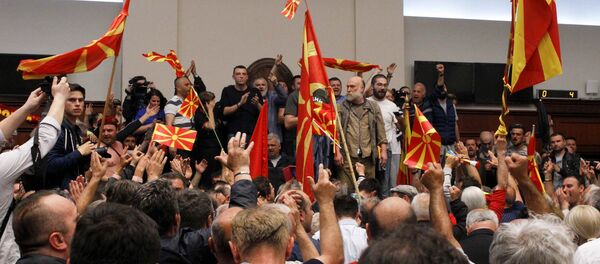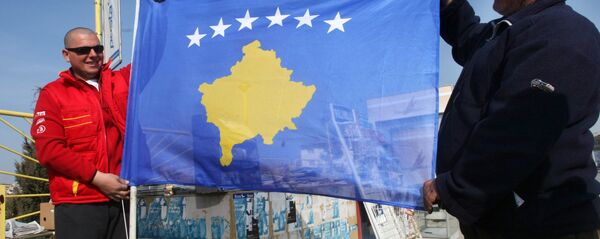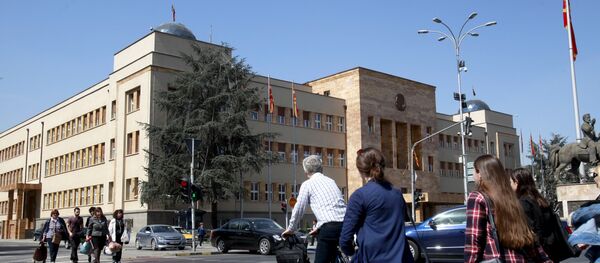On April 27 protesters stormed into Macedonia's parliament and attacked Social Democratic Union of Macedonia (SDSM) party leader Zoran Zaev. The unrest erupted over the election of Albanian deputy Talat Xhaferi as speaker of the parliament.
Macedonia has been engulfed by a political crisis for almost two years now. The situation deteriorated on March 1 when President Gjorge Ivanov refused to grant Zaev the mandate to form a government, although the opposition leader secured a majority in parliament with ethnic Albanian parties.
The ruling center-right VMRO-DPMNE party led by former Prime Minister Nikola Gruevski won 51 seats in the election, the largest proportion of any party in Macedonia's 120-seat parliament, while Zaev's SDSM got 49 votes.
To tackle the problem Zaev has teamed up with the Albanian political party — the Democratic Union for Integration (DUI) — to form a coalition government.
"The Social Democrats led by Zaev do not want to recognize the authority of President Ivanov. They will insist on their choice [Xhaferi], and they will not draw back. But they have a serious problem, they cannot enter the Parliament. Everything they did was illegal. And the situation is very bad, the country split in two," Nedelkovski told Sputnik.
In his op-ed for RIA Novosti Igor Pshenichnikov, advisor to the director of the Russian Institute for Strategic Studies (RISS) explains that the SDSM-DUI coalition would not have triggered serious concerns if only it was not based on the so-called "Albanian Platform," propagated by the Albanian politicians.
"Albanians are ready to cooperate with the SDSM if the Albanian language gains the status of the second state language in Macedonia. [They insist] that the issue of the federalization of the country (that actually means dividing the country along ethnic lines into the Macedonian and Albanian parts) should be considered. There is also a discussion about a new coat of arms, flag and other symbols of the state," Pshenichnikov wrote.
Pshenichnikov highlighted that it is no secret that Tirana is dreaming of creating a so-called Greater Albania.
RIA Novosti contributor Dmitri Dobrov shares a similar stance. The journalist elaborated that the Greater Albania doctrine says that the territories in southern Montenegro, southern Serbian territories including Kosovo and the Presevo Valley and northwestern parts of Macedonia should be incorporated in the existing Republic of Albania.
"The total number of Albanians in the Balkans amount to more than eight million people, including three million in Albania itself, one million and a half in Kosovo and Serbia and over half a million in Macedonia," the journalist noted, warning that the Macedonian crisis may escalate into a pan-Balkan conflict.
Speaking to RT, Elena Ponomareva, professor at the Moscow-based MGIMO University of the Russian Foreign Ministry, noted that the Albanian opposition in Macedonia enjoys support from both Tirana and Brussels.
The Russian academic believes that the strategy of uniting the Albanian people in a single state is being currently implemented in the Balkans. The new entity will consist of Albania, Kosovo and the Albanian-inhabited regions of Macedonia.
"Macedonia is the weakest link in this strategy," Ponomareva said, "The country does not have a capable army and even a name. The 'Albanization' of the Balkans is supported by EU officials, who probably consider Muslims as a tool to oppose Serbia and in the Slavic Orthodox culture in general."
According to the academic, Macedonians are forced to defend their position; still, the main battle is yet to come.
"Much depends on the president's determination. Colossal pressure will be exerted on Ivanov from both external and internal forces, including the right-wing groups," she emphasized.
